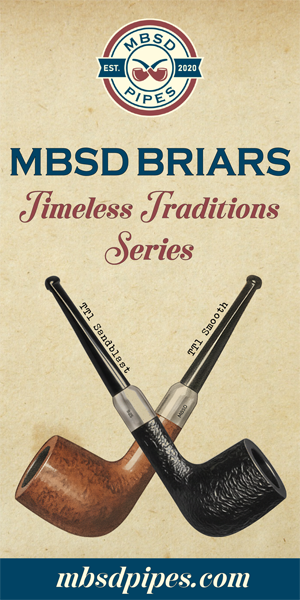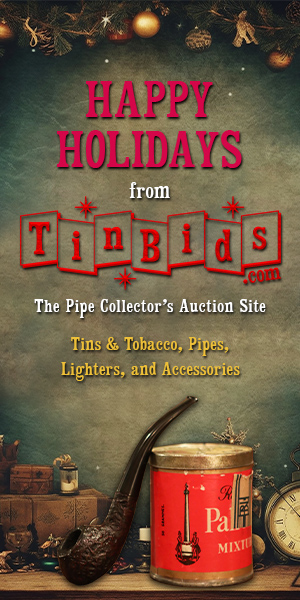Well it also a fact that in order to call corn whiskey aged in charred oak barrels bourbon legally it must be made in Kentucky. That means that Jack Daniels is not bourbon. In my opinion these labelling rules don't matter
Real Perique?
- Thread starter itsnotuitsme
- Start date
You are using an out of date browser. It may not display this or other websites correctly.
You should upgrade or use an alternative browser.
You should upgrade or use an alternative browser.
SmokingPipes.com Updates
Watch for Updates Twice a Week
Always enjoy a good Perique thread. My favorite leaf.
Something that grabbed my interest was pointed out on the podcast, a very early episode. Maybe Brian and Rich Esserman? Rich (I believe it was him anyways) mentioned smoking perique straight. I've done this with varying results. My favorite perique smokes great by itself, though potent. Others, not potent at all and a taste I don't care for. But Rich mentioned how back in the 70s, if you smoked a bowl of straight Perique, it'd make you sick or make your head spin. I have a high Vitamin N tolerance and don't know if this is a factor, but even Brian agreed perique isn't what it was back then. So what's changed??
Something that grabbed my interest was pointed out on the podcast, a very early episode. Maybe Brian and Rich Esserman? Rich (I believe it was him anyways) mentioned smoking perique straight. I've done this with varying results. My favorite perique smokes great by itself, though potent. Others, not potent at all and a taste I don't care for. But Rich mentioned how back in the 70s, if you smoked a bowl of straight Perique, it'd make you sick or make your head spin. I have a high Vitamin N tolerance and don't know if this is a factor, but even Brian agreed perique isn't what it was back then. So what's changed??
Last edited:
What's changed is who's growing Perique, who's processing Perique, how it's processed. I didn't smoke Perique straight, back in the '70's, so I can't comment. I've smoked it straight and enjoyed it. Try some Percy Martin Farms Jewel of St James and you'll get a whole different picture of the beast.it'd make you sick or make your head spin. I have a high Vitamin N tolerance and don't know if this is a factor, but even Brian agreed perique isn't what it was back then. So what's changed??
There were more farmers and they did their own processing, rather than just growing red burley and sending to LA Poché to process it into Perique.
In general, tobaccos took a few quality drops since the '70's, not 100% of production, but a sizable percentage, and people acclimate themselves to what they're familiar with.
Back in the day there were probably no more than a half-dozen farmers making perique. Maybe it was just the Martins. And as I understand it growing tobacco is a lot of work, so no wonder. At some point during the recipe's distribution it was standardized?What's changed is who's growing Perique, who's processing Perique, how it's processed. I didn't smoke Perique straight, back in the '70's, so I can't comment. I've smoked it straight and enjoyed it. Try some Percy Martin Farms Jewel of St James and you'll get a whole different picture of the beast.
There were more farmers and they did their own processing, rather than just growing red burley and sending to LA Poché to process it into Perique.
In general, tobaccos took a few quality drops since the '70's, not 100% of production, but a sizable percentage, and people acclimate themselves to what they're familiar with.
I would want it to be a boutique process that in recognition of the unique and very important part that perique plays in blending, should be produced as a specialized product promoting the individuality of the grower and his farm's terroir.
But there's no money in doing this.
PS I read an account about a man growing grapes that had one terroir on one side of the hill and another on the other.
It's a romantic notion, but if they did that, we'd get no Perique whenever the local farms had a crop failure. It's been known to happen.I would want it to be a boutique process that in recognition of the unique and very important part that perique plays in blending, should be produced as a specialized product promoting the individuality of the grower and his farm's terroir.
But there's no money in doing this.
Or some really below par product. With all of the weather related stuff hitting, we may be in for some very unpredictable years.It's a romantic notion, but if they did that, we'd get no Perique whenever the local farms had a crop failure. It's been known to happen.
I don't like the McConnell perique, real or not, I think it’s just not good, at least compared to the other perique I’ve been able to buy. You can get better stuff whole leaf or sometimes C&D. It’s just bland. I mean, it’s smokable, just wouldn’t get more if other options are available. But taste is subjective.A few days ago I finally openened my tin of Robert McConnell Pure Perique. Fantastic Stuff. Love it for mixing. Im on my first pure bowl right now (dare I say, it took quite a bit of courage, as the tin smells as if I cured my old underpants in a dung heap for a few days - fantastic stuff non the less).
Now, if I am to believe tobaccoreviews, it's not "real" perique. So i have to ask: What is? And to add, is it worth going for another "real" perique or are they rather similar in taste (pure or mixed)?
Edit: While we're on it, another thing i can't quite figure out: Is perique purely a process, or is there a special sort of tobacco used exclusively? i read that it's supposed to be a variety of red burley, but somewhere else i saw virginias mentioned etc. etc.
Wouldn’t it have to be the base leaf used?Always enjoy a good Perique thread. My favorite leaf.
Something that grabbed my interest was pointed out on the podcast, a very early episode. Maybe Brian and Rich Esserman? Rich (I believe it was him anyways) mentioned smoking perique straight. I've done this with varying results. My favorite perique smokes great by itself, though potent. Others, not potent at all and a taste I don't care for. But Rich mentioned how back in the 70s, if you smoked a bowl of straight Perique, it'd make you sick or make your head spin. I have a high Vitamin N tolerance and don't know if this is a factor, but even Brian agreed perique isn't what it was back then. So what's changed??
I just read through this entire discussion and it seems that everyone believes that Perique is just a process.
Perique is also a strain of tobacco that was "discovered" when the Spanish first colonized the Louisiana territory.
I will have to search for it, but at one time I had historical records from the early 1900s that talked about Perique.
From what I remember of my discussions with Mark Ryan, Perique crops almost completely died out in the 1950s because economic and environmental reasons. It's hard to grow perique when hurricanes keep flooding the tobacco fields.
Perique is also a strain of tobacco that was "discovered" when the Spanish first colonized the Louisiana territory.
I will have to search for it, but at one time I had historical records from the early 1900s that talked about Perique.
From what I remember of my discussions with Mark Ryan, Perique crops almost completely died out in the 1950s because economic and environmental reasons. It's hard to grow perique when hurricanes keep flooding the tobacco fields.
True... but, Mark also mentioned that he bought burleys from other places to add to the leaf that he was "periquing" (for lack of a better verb). And, he also has perique'd Virginias with Russ Ouellette. And, there have been experiments that have led to semois perique and other varieties that are very tasty.I just read through this entire discussion and it seems that everyone believes that Perique is just a process.
Perique is also a strain of tobacco that was "discovered" when the Spanish first colonized the Louisiana territory.
I will have to search for it, but at one time I had historical records from the early 1900s that talked about Perique.
From what I remember of my discussions with Mark Ryan, Perique crops almost completely died out in the 1950s because economic and environmental reasons. It's hard to grow perique when hurricanes keep flooding the tobacco fields.
I know that Mark has to keep LaPoche viable, with competition coming on his heels. He is a spinner of marketing copy. But, according to him, he is the only source of perique. But, as we saw at that little tiny barn, there is no way that little place is making the world's supply of perique.
At the same time Mark is telling us this stuff about his perique being the only source of "real perique", he is also telling us that he is sourcing leaf from many places for various parts of his process, AND that he is blending the perique with burley to stretch it out... with the help of Greg Pease as his taste tester.
I can go to several different seed banks online and buy perique burley seeds, so...
So, I love Mark and respect the hell out of him. I hope one day to get to visit with him again... but... he really doesn't own the process nor the terminology. So, basically the market decides. You and me get to decide by what we buy and enjoy. If a blend claims to be a VaPer, but we don't like it, we stop buying it.
Last edited:
One writer said that there are some tobacco plants best called perique. I'm unsure that this is true, as I start from perique as a process. In this some leaf may have characteristics that are more suitable for the perique process, but if so isn't this by a palate determined? If you are growing red burley you are not growing perique, you are growing a tobacco particularly amenable to undergoing the perique process.
I would think you're correct. Crop/base leaf has changed, though the process could have as well. It could have gone from a "quality" standard to a "production" standard. Though others have maintained quality since then.Wouldn’t it have to be the base leaf used?
So I'm still unsure of what's changed that Rich was referring to.








